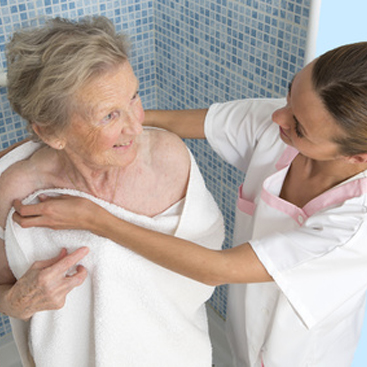Advice And Guidance on Helping Your Elderly Parent to Bathe
When we are young our parents help us to bathe. But often, as we age, the roles can be reversed where adult children find themselves needing to help their parents undertake bathing and other hygiene tasks.
This can be an uncomfortable situation for both adults and their senior parents. While you undoubtedly want the best for your parent regarding safety and hygiene, doing so while respecting and maintaining their dignity can be a challenge.
When it comes to discussing bathing and assisting with the process, there’s no one-size fits all approach. Every senior and their adult child will require their own method and collaborative solution to the difficulties that naturally result from ageing. There are, however, many tips and strategies that can help you both achieve the best outcome.
Do you need to discuss bathing?

If your parent has entered their senior years, you may need to discuss the topic of assisted bathing with them. This discussion can be an anticipatory talk about your plans should your parent require assistance down the track or it may be as the result of a change in circumstances.
There can be many reasons why you may need to discuss bathing with your parent. Has their physical health deteriorated to a point where it may no longer be safe for them to bathe independently? Do you have concerns about their hygiene?
Hygiene can be a common cause for concern amongst adult children with senior parents. Due to ageing, showering can become more difficult or even frightening, leaving many seniors reluctant to bathe.
Other elderly parents may be experiencing memory loss or mental issues and simply forget to bathe regularly. As their senses may have declined, they are likely to be unaware that they even have an issue with their personal hygiene.
How to broach the topic of assisted bathing
Once you’ve decided to discuss assisted bathing with a senior, you should take some time to think about how you will broach the topic and prepare what you will say. As this can be a sensitive subject, it’s important to be considerate and take your parent’s feelings into account.
It’s best to approach this as a respectful conversation where both parties contribute to achieve positive results. Although your parent may initially be reluctant to discuss the issue or acknowledge they need help, don’t give up. Try taking things slowly and pointing out the benefits, including how good they’ll feel with regular, safe bathing.
If your parent needs assistance with safe showering or bathing, working together to find a solution that works for everyone will likely yield the best results. Discuss whether the installation of shower aids will be enough to ensure your parent’s safety or if they need a carer to assist them.
If someone needs to assist your parent with bathing, consider asking them who they will feel most comfortable with. While some seniors will enjoy the comfort of a close family member, many others prefer the professionalism and privacy of an agency carer.
If you do contact an agency, ask if they will send the same person every time. Having a consistent carer instead of a string of different aids will help make your parent feel more relaxed and comfortable when bathing.
Working with your parent to establish a regular bathing routine will also help manage expectations. To do so, collaboratively set days for washing and outline whether it will be a shower, bath, sponge bath, or other. Then, place it on the calendar to help them remember.
What to do if they refuse to bathe?
If your parent refuses to bathe, you need to figure out their motives. Once you understand the reason behind their behaviour, you’ll be able to help them move past the issue.
Reasons why seniors refuse to bathe vary, but they can be linked to issues of independence and a reluctance to ask for help, as well as fear relating to the dangers of showering. If either of these issues has caused your parent to stop bathing, you should try gently discussing the problem with them and work together to find a solution.
Mental deterioration and underlying mental health issues can also affect a senior’s desire to bathe. If you feel that your parent is experiencing either of these, consider enlisting help from a professional who can give you guidance on the topic.
Helping your parent to bathe
Respecting someone’s dignity doesn’t stop after the initial discussion about bathing. If you’re going to be helping your parent to bathe, you should always try to make the process as comfortable and pleasant as possible.
Aim to be kind and considerate throughout each bathing experience and try to understand that it may be uncomfortable for both of you. To ease any awkwardness, try to allow for as much privacy as possible and consider preparing some small talk to make conversation easy.
Also, ensure that you have allocated plenty of time for the process. Bathing a senior can be time-consuming and rushing can be dangerous and may make your parent feel upset.
For more information and guidance, read our comprehensive Safe Showering and Bathing Guide to find out the best ways to make regular washing easy and pleasant for seniors.


































